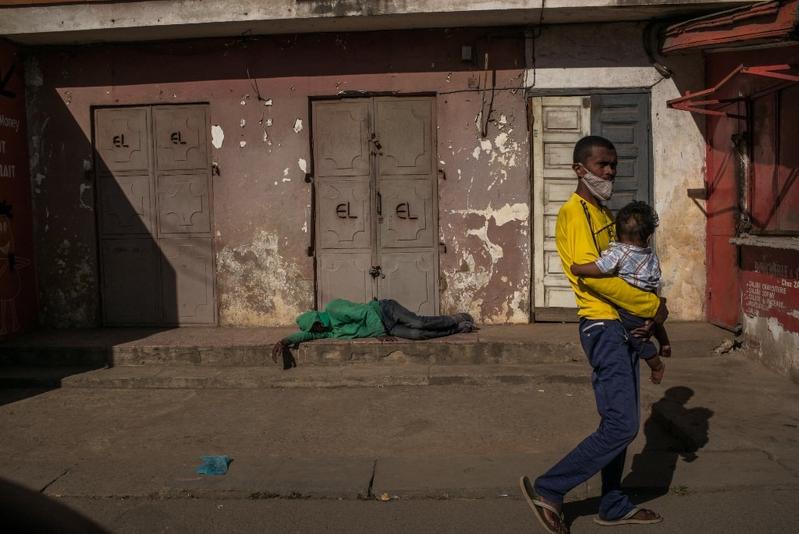 In this file photo taken on April 24, 2020, a man carries a child along a deserted and shuttered street after Malagasy authorities decreed a total lockdown in the capital Antananarivo, to avoid the proliferation of COVID-19. (RIJASOLO / AFP)
In this file photo taken on April 24, 2020, a man carries a child along a deserted and shuttered street after Malagasy authorities decreed a total lockdown in the capital Antananarivo, to avoid the proliferation of COVID-19. (RIJASOLO / AFP)
Southern Madagascar is on the brink of a severe humanitarian crisis as hundreds of thousands struggle with the impact of a prolonged drought, according to United Nations officials.
“The hunger season is coming,” Issa Sanogo, the UN resident coordinator on the Indian Ocean island nation said on Saturday. People may be left “without the means to eat, without money to pay for health services, or to send their children to school, to get clean water, and even to get seeds to plant for the next agricultural season,” he said.
Insufficient rains since 2019 in the Grand Sud or the Big South of Madagascar have caused the most severe drought since 1981
Insufficient rains since 2019 in the Grand Sud or the Big South of Madagascar have caused the most severe drought since 1981. People have resorted to desperate survival measures such as “eating locusts, raw red cactus fruits or wild leaves” according to ReliefWeb, an information service provided by the United Nations Office for the Coordination of Humanitarian Affairs.
ALSO READ: Hunger grips drought-hit Madagascar
Madagascar is the world’s largest grower of vanilla, most of which is produced in the northeast of the world’s fourth-largest island. Citizens in the south rely on subsistence agriculture from small landholdings, according to reports from the World Bank.
“The south is vulnerable because it’s dry, while the north has tropical rain-forests” said Shelley Thakral, a spokeswoman for the United Nations World Food Programme, which is looking to raise US$78.6 million in emergency aid to feed people in the region. Residents haven’t managed to produce crops and with the “start of the lean season approaching” the situation can get worse, she said.
A report published this month stated that more than 500,000 children younger than five years of age face the risk of malnutrition between May 2021 and April 2022.
“The drought has gone on for longer than expected, and the funds received are insufficient to cover current and future needs,” Sanogo said. “We must act now: annual crops are a problem that will probably become a new crisis in the next agricultural season.”
READ MORE: French citizen among 6 held over plan to kill Madagascar president


